Belarus Mission Trips
MY MISSION TRIPS TO BELARUS
Looking at my Visa stamps in my expired passports, it appears that my first mission trip was to Belarus back in 2004. Belarus is one of those countries that emerged from the collapse of the Soviet Union. Where is it located? If you are in German, and head east, you will be in Poland. Go a bit further and you are in Belarus.
Belarus has a very tragic history. Nazi Germany invaded Russia in June of 1941. During the war Belarus lost one fourth of their entire population and 90% of its capital city, Minsk, was destroyed.
One tactic that the German military used was to enter a village, herd everyone into a barn, lock it up, cover its roof with straw then set it on fire. One such village, Khatyn, was turned into a memorial to the many villages that were destroyed during the war.
Below is a YouTube video on the memorial to the Khatyn Massacre.
There are war memorials all over Belarus. The people are very aware of their tragic 20th century history. One of their traditions is for newlyweds to visit one of the memorials on their wedding day to pay their respect to those who died in the war. Of the 60 million people who died in World War II, most of them were civilians and 20 million were Russians. By contrast, fewer than half a million Americans died and none of our cities were destroyed. This means that for every American who died in the war, forty Russians died.
Below is a picture of one of the many memorials to World War II.
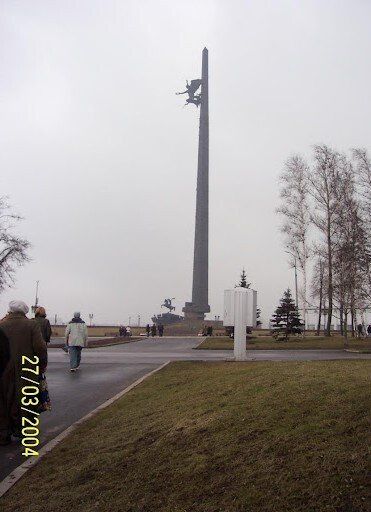
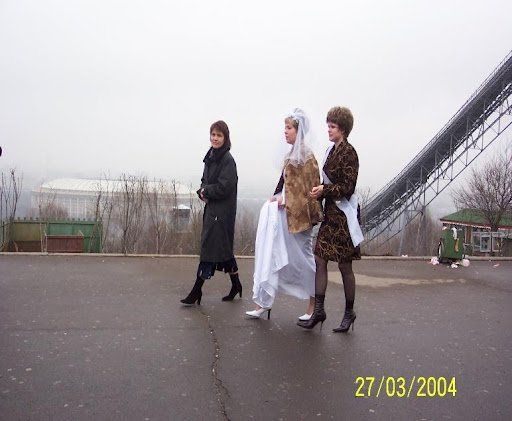
The photo above is a bride having her photo taken at a war memorial.
Today Belarus is led by “the last dictator in Europe,” Alexander Lukashenko. He’s able to remain in power because of the KGB or secret police. The KGB suppresses all dissent in Belarus and uses domestic surveillance to keep an eye on everyone, including tourists. I was told by my interpreter that my hotel room, phone, and computer were all bugged. But the KGB wouldn’t bother me as long as I didn’t get “political.”
To suppress political dissent, politicians who run against President Lukashenko get beaten up while campaigning against him. While hospitalized they are kidnapped by men in black clothing (KGB) then taken to mental a hospital. Why to a mental hospital? The profession of psychiatry has been weaponized by the government. If a person is critical of the government, has reformist ideas, can’t seem to conform to the government, and expresses dissatisfaction with the dictator, they are considered to be mentally ill. Their illness is called “sluggish schizophrenia.” They are “treated” with drugs and electroshock therapy to help them “recover” from their reformist ideas and inability to conform. Here are a few videos to show how the KGB is used to keep Belarussian citizens in line.
I’m sharing these facts with you to give you an idea of the atmosphere in the country. People are suspicious of one another; they don’t oftentimes make eye contact in public.
What was I doing in Minsk? I was teaching at the Minsk Bible College in Belarus located at the Bethlehem Church below.
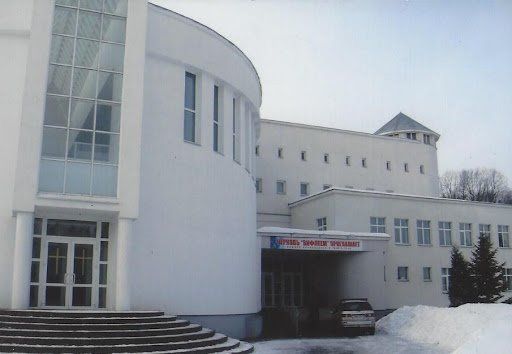
When I was on these trips, my main function during the week was to teach. I usually taught all day and then on the weekends I was usually asked to preach somewhere.
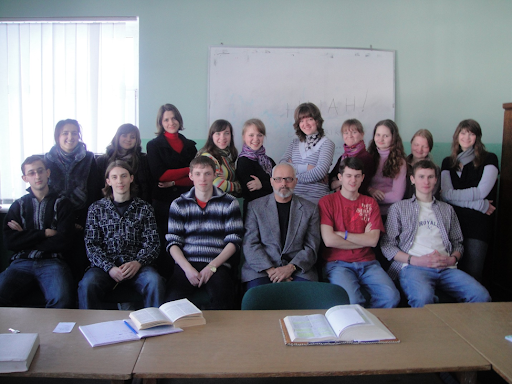
Above is a picture of one of the classes at the Minsk Bible College. Besides teaching, I also provided students with new study Bibles and any other resources that I could find for them.
I was told that there was a Christian bookstore in town, but it was no larger than a small bedroom in the back of a coffee house. As you can imagine, the inventory was very limited.
The circus is a popular attraction in Belarus, as it is in Russia. In Minsk the circus isn’t housed in a tent, but a permanent building and operates year-round. Below is a picture of the Minsk Circus.
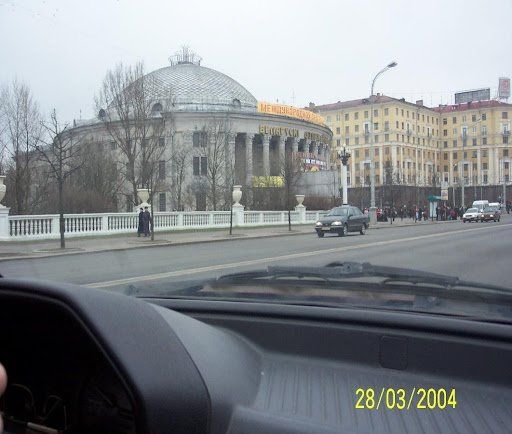
The students at the Minsk Bible College were low income and they had never been to the local circus, or for that matter a McDonald’s. We remedied this on one of my visits.
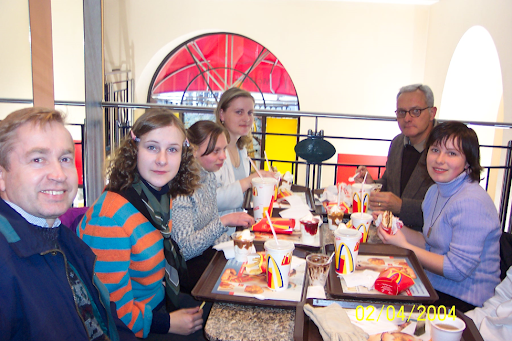
On the far left is one of my interpreters, Anatoly Istomenok. He and his wife Ludmilla were my hosts while in Minsk.

This is the circus.
One weekend the college official planned for me to be picked up at my hotel in Minsk to be taken for the weekend to a town or Korbin, near the Polish border. Below is a photo of me waiting for my ride to Korbin.
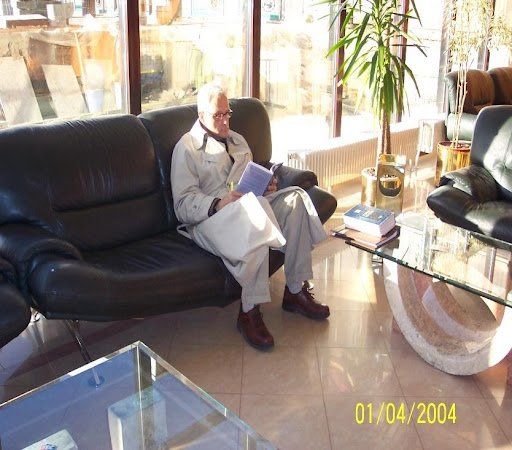
A couple of Russian speaking men came in and approached me. They spoke very little English and I spoke no Russian. As we were walking towards their van I was wondering, “What if they got the wrong person? What if I’m getting into the wrong van?” “What if this is a KBG plot to kidnap me?” I stopped before I got into the van and after a conversation of mangled English and hand gestures, etc. I was reasonably certain that everything was going to be ok.
We traveled west for several hours when the driver turned to me and asked if I would mind spending the night in the camp. Camp? What’s he talking about? This is winter in Belarus. Winters aren’t easy to handle, especially if you are in a camp. The Germans learned that lesson in World War II. What could I say? The driver pulled up to a gate, someone in a uniform stepped out of his hut and approached the vehicle. They spoke to one another in Russian. What might they be saying? “I have a hostage for us?” I hope not. He raised the gate and we drove up to an old two story brick building. I was led in to a small bedroom and was told that I would be the only person in the building that night. On a table was some bread, cheese and a bottle of warm Coke. He told me he would be back the next day and then he left. Did I know where I was? No. Did I have any means of communicating with anyone? No. What if no one showed up the next day? What if I was being held hostage? What if he called my wife and demanded a ransom for my safe return? What if my wife said, “I’ll pay the ransom, but only if you keep him.” What am I going to do?
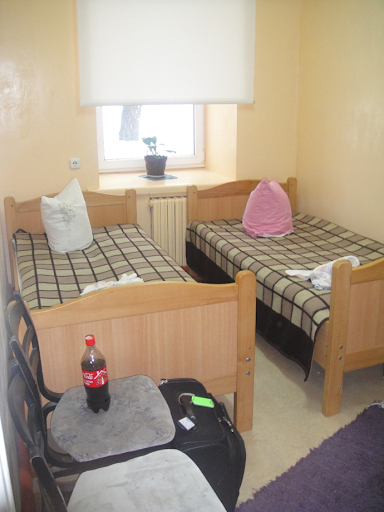
Above is a picture of my room room where I was left alone in a building in a town I knew not where. Fortunately, the next day, the driver appeared and off we went.
What was that “camp” where I stayed? It was a Bible camp owned by the church. But it wasn’t always a Bible camp. It used to be a Soviet Ballistic Missile site. It’s ironic, there I was, a retired U.S. Army officer, sleeping in a room where, at one time, Soviet military personnel had lived with their missiles pointed at the U.S.
Below is a water tank for the camp which was once a part of a ballistic missile. Talk about beating swords into plowshared and spears into pruning hooks.
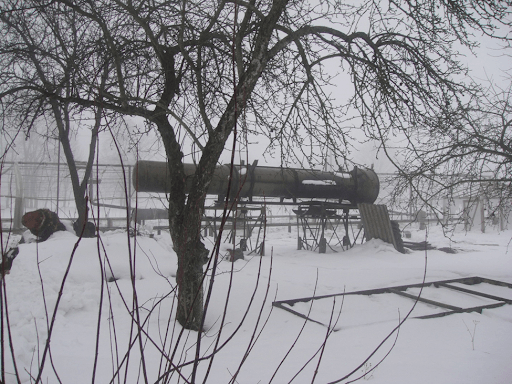
The driver ultimately took us to the town of Kobrin, near the Polish border. There I was invited to speak at the largest Protestant church in Belarus. The church was built by its members.
All was going well with the constructioin until they couldn’t get something very heavy onto the roof to complete the project. What to do now? The members decided to pray about the situation. Before long a huge truck with a flatbed trailer broke down just outside of the town on the highway leading from Moscow to Warsaw, Poland. On the back of the flatbed trailer was a huge crane. Since the truck repair would take some time, someone from the church approached the driver and asked if he might be able to help. The driver took the crane off the trailer, made his way to the construction site and completed the project by lifting whatever it was that needed to be put onto the roof. I bet the driver was very well cared for by the church members while he awaited his repair parts for his truck.
The church was beautiful with wonderful wood work inside, but it didn’t have a single bathroom. No, it wasn’t an oversite by the planners. The restrooms are in a separate building located on the other side of the parking lot.
I was invited to preach on Sunday. But unlike churches in America, I wasn’t the only one to preach. There were four sermons delivered that day. The service lasted for several hours. Is this because the people are especially devout? Perhaps. But they also have little to occupy their minds. What little radio and television programming there is is controlled by the government. Plus, if you have to get dressed and walk to church, you want to spend more than an hour there, otherwise it isn’t much worth the effort. If I recall, besides the bathroom issue, I don’t think the building was heated. I recall the people sitting with their coats on.
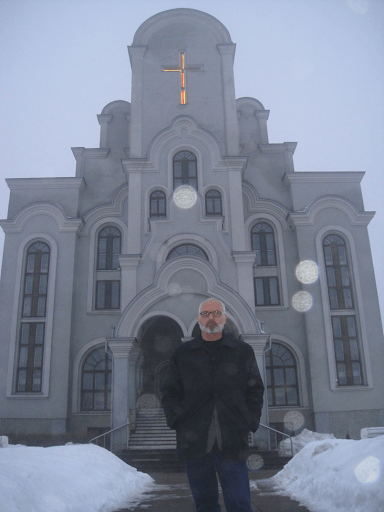
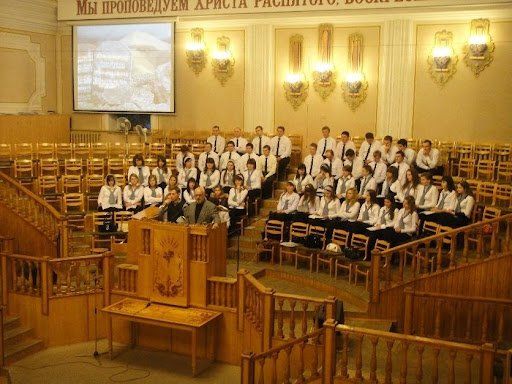
On another one of my trips to Belarus (one of six) I was able to take a train to Moscow and visit Red Square. The train ride began at about 6 p.m. and took about 12 hours. At Red Square I was able to visit inside Lenin’s Tomb. But before we were allowed into the tomb to view the embalmed body of Lenin, Russian soldiers frisked us. Much like my visit to the former missile site in Belarus, there I was, a retired Army officer being frisked by a young Russian soldier. If I had just woken up and found myself in this situation I might have thought, “Oh no, did the U.S. go to war with Russia and now I’m a POW?”
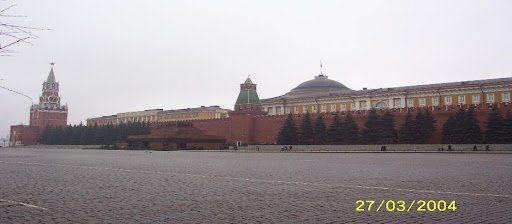
My interpreters, Anatoly, and Ludmilla, have a small house in the village of Mir. One time I spent the weekend there and on Saturday night they invited people over to their house for a meal, a Bible study, and a few songs.
In Belarus, for you to host such an event in your home you must register with the government and list all the people who participate. In the picture below you will see a few of the guests, mostly older people.
The lady in the lower right of the photo was a medical student when she was young. One day the dean called her in to his office and asked her if she was a Christian. She said “Yes.” That was the end of her medical training.
The young men in the photo were two of students at the Minsk Bible College.
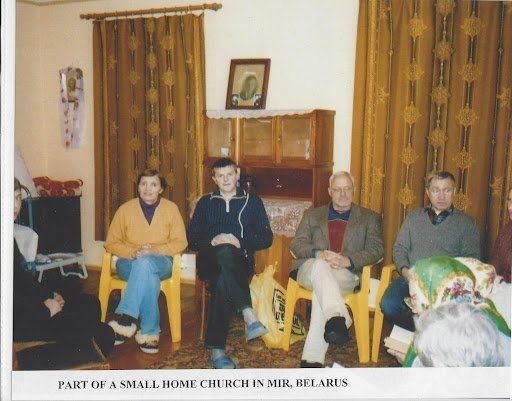
The stock market crash in 2008 led to the close of the Minsk Bible College. How did that happen? The college was financed, in part, by the visiting instructors. Each instructor was asked to donate around $1,000 to help finance the school. When the stock market crashed, many American pastors saw a steep drop in contributions. This led to cuts in church personnel and money for mission trips.
Today, Alexander Lukashenko is still in power, thanks to the assistance of the KGB. Lukashenko continues to jail opponents, stifles independent media, and holds elections that guarantee him remaining in power. After the last election protests have broken out which led to club-swinging police and mass detentions.
As one door to ministry closed, another door opened. Soon after my teaching trips to Belarus came to an end I was invited to teach in Tanzania, east Africa.
Recent Articles
Share this:
Start Here...
Why Study the Bible?
Don’t many consider the Bible to be just a book of myths? Why do we read the Bible rather than the sacred literature of other religions?
How do we know that it is from God? How do we know that what we have today is an accurate translation from the original? Is the Bible complete or have there been some books that have been lost?
We should be able to answer these questions, and there are answers! So start here!
Answers to Common Bible Questions





